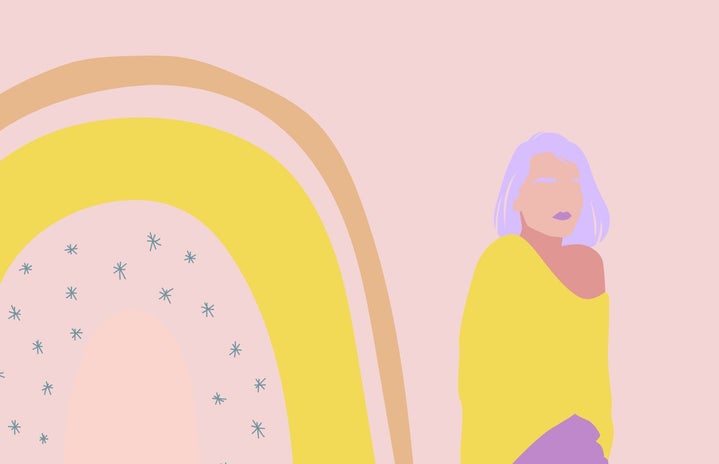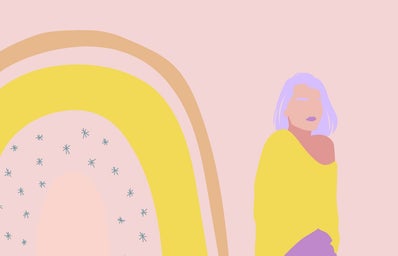A day I will remember for the rest of my life occurred last September. I stepped out of the SSB building, having just finished an appointment with the sweet CMHC social worker, and sat outside on the bench. I had just gotten an estimate for the program she had recommended me for; I couldn’t keep everything that had happened the past few weeks all to myself anymore.
It was a cloudy day, and it rained as I called my parents and began to tell them everything. The weather fit the way my heart was feeling as I told them what I had been hiding for so long, sobbing openly and without being able to stop from the overwhelming relief of it all.
The truth I had kept hidden from them for over 6 years was that I deeply hated my body and myself. My distress about the way my body looks has ebbed and flowed over that time, but even when it wasn’t an immediate priority, it was a weight chained to the back of my mind, dragging the rest of me down. Somewhere along the way, I had decided cutting out food and trying desperately for a size and shape that my body would never realistically achieve would be the answer to all my problems.
There’s a lot of stigma around eating disorders and anorexia. I’ll be the first to tell you that most of what you may think isn’t true. Most people diagnosed with eating disorders are not at the extremes of body size as the media often shows. It’s not always fueled by an obsession with beauty standards. Perhaps most surprising to hear is that most of the time, it’s not even about food.
It’s about finding control. It’s about numbing pain. It’s about trying desperately to endure.
My health was in shambles: I had all the medical indicators of malnourishment, and on a daily basis, I would be in so much pain I could only lay in bed and wait for it to go away. I was lethargic constantly, and only halfway there mentally at the best of times. I was a slave to the demon that had grown without my knowledge in my mind, to the point that I couldn’t find where the disordered voice ended and I began. I didn’t really know who I was underneath it; I’d lost myself to the throes of anorexia.
The truth was I should have been taken to the hospital, but instead I was placed in 10 hours a week of therapy and meetings with a rotating list of dieticians, therapists, general practitioners, psychiatrists. It was a lot all at once, but this disorder is a monster; without any bit of the support, I wouldn’t have been able to pull myself out tooth and nail the way I did.
It has been almost 6 months since I was discharged from intensive care, when I had no idea what to expect and was terrified I’d fall right back to being the victim of my anorexia. What I didn’t realize was how much I would learn about myself when it was finally just me taking up my mind and my body — when I was finally free.
I’ve learned that my body is beautiful, not because of its appearance, but because it is the vehicle that I use to navigate life. I finally know how to recognize and honor my hunger cues, even if they’re not what diet culture says they should be. I can finally eat my favorite foods like pastries and sweet drinks, knowing that I am taking in the nutrition that I need and enjoying what I didn’t allow myself for so long. I can exercise and get stronger and take my favorite aerial hammock or lyra classes without my mind in a cycle of never-ending comparison against the other students, detracting from celebrating what my body can do.
Those are all really big things, but it’s the smaller things that are probably what make me happiest. I know what real happiness feels like on a day that’s going well; not the muted version anorexia would only ever let me feel. I can fully engage in a conversation without having so much brain fog, anxious thoughts, or lost memory to concentrate. I can browse clothes in the styles I like, without telling myself they’re out of reach until I look a certain, unachievable way. I’ve even learned that I’m not even the introvert I thought I was because I was so used to isolation; I thrive when I’m making connections with others, whether it’s catching up with a long-time friend or learning new things about a person I find interesting and am drawn to.
When I first went into treatment, it was because I knew that was what the CMHC people said I needed. I thought I would only listen passively and leave, content to remain with my destructive habits. Instead, I will never be able to put into words how thankful I am to the mental health professionals who helped me through it, to the other patients I met who were brave enough to share their struggles, and to my family and friends who knew and were willing to help me in any way they can.
I’m not going to lie and say anorexia is completely gone from my life; I’m not sure that voice in my head ever will be. Some days are harder than others, and I still have to fight every day. But it has gotten easier, and I am in a mental place I used to believe was merely a fantasy. Most importantly, I finally feel like I know who I am.
If you or someone you know is struggling with disordered eating or body image distress, I want you to know I understand how hard it is. You are not only the way you look or the way you eat, and you did not do this to yourself. Everybody I have met in treatment has been unbelievably smart, caring, and shining lights to the people around them. I wish them the world. Even if it is with ambivalence, I ask you to try and take it one tiny step at a time.
You are not your struggles, you beautiful human being. You deserve to be healthy and discover yourself. Go out there and take on the world.


